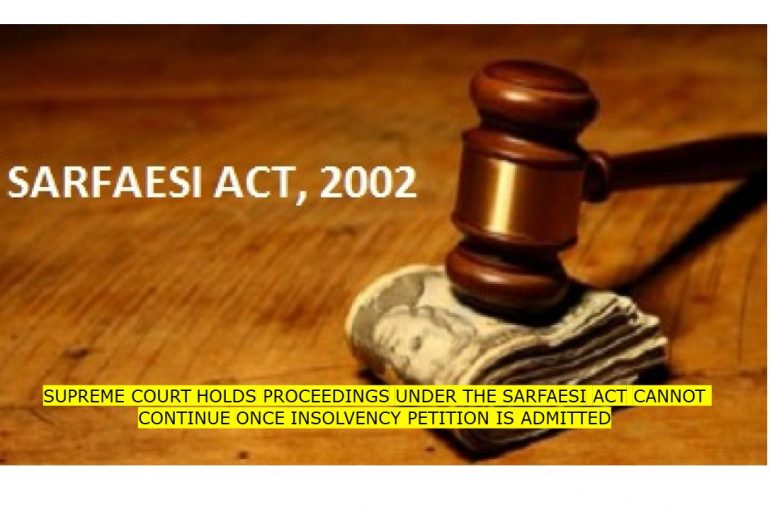SUPREME COURT HOLDS PROCEEDINGS UNDER THE SARFAESI ACT CANNOT CONTINUE ONCE INSOLVENCY PETITION IS ADMITTED
A Two-Judge Bench of the Supreme Court comprising of Justice L. Nageswara Rao and Justice B R Gavai, while deciding the case of Indian Overseas Bank vs RCM Infrastructure Ltd. and Another, CIVIL APPEAL NO. 4750 OF 2021, passed a Judgement dated 18.05.2022 and held that the proceedings under the Securitization and Reconstruction of Financial Assets and Enforcement of Security Interest Act, 2002 (SARFAESI Act) cannot continue once the Corporate Insolvency Resolution Process (CIRP) is commenced/admitted and the moratorium is ordered under the Insolvency and Bankruptcy Code (IBC).
In this case, the Appellant – Indian Overseas Bank had extended certain credit facilities to the Respondent, RCM Infrastructure Ltd (Corporate Debtor). However, the Corporate Debtor failed to repay the dues. As such, on 13.06.2016, the loan account of the Corporate Debtor came to be classified as “Non-Performing Asset” (NPA). The Bank took symbolic possession of two secured assets mortgaged exclusively with it in exercise of powers conferred on it under Section 13(4) of the SARFAESI Act. The Bank issued a Notice for e-Auction to recover the public money availed by the Corporate Debtor on 27.09.2018. On 22.10.2018, the Corporate Debtor filed a Petition under Section 10 of the Insolvency and Bankruptcy Code, 2016 (“the IBC”) before the National Company Law Tribunal (NCLT), New Delhi. Meanwhile, on 13.12.2018, the sale was confirmed in favour of the successful bidders in the public auction under SARFAESI Act. The successful bidders deposited 25% of the bid amount. On the other hand, the NCLT admitted the IBC Petition on 03.01.2019 and a moratorium (a cooling period where there is no judicial proceeding against corporate debtors) was also notified. But even thereafter, the Bank continued the auction proceedings and accepted the balance 75% of the bid amount and completed the sale. The NCLT vide Order dated 15.07.2020, allowed the Application filed by the Corporate Debtor and set aside the sale conducted by Bank under SARFAESI Act. The Bank filed an Appeal before the National Company Law Appellate Tribunal (NCLAT), which was dismissed vide Order dated 26.03.2021. The Bank thus preferred an Appeal before the Supreme Court.
The Apex Court considered Section 14(1)(c) of the Insolvency and Bankruptcy Code and observed that after commencement and admission of ‘CIRP’, which is a recovery mechanism for the creditors of a corporate debtor, a moratorium is declared by NCLT in respect of any action to foreclose, recover or enforce any security interest created by the corporate debtor in respect of its property including any action under the SARFAESI Act. It is clear that once the CIRP is commenced/admitted, there is complete prohibition for any action to foreclose, recover or enforce any security interest created by the Corporate Debtor in respect of its property. The Supreme Court further held that IBC is a complete Code in itself and in view of the provisions of Section 238 of the IBC, the provisions of the IBC would prevail notwithstanding anything inconsistent therewith contained in any other law for the time being in force.
It was the contention of the Appellant Bank that the sale in question was complete on its confirmation on 13.12.2018 and the admission of the Petition on 03.01.2019 by the Learned NCLT would not affect the said sale. The Supreme Court, then relied on the judgement of Kaliaperumal v. Rajagopal and Another, (2009) 4 SCC 193 in which inspite of registration of the sale deed, in the facts of the said case, the Court held that what was important is the intention of the parties. It was held that normally the ownership and the title of the property will pass to the purchaser on registration of the sale deed with effect from the date of execution of the sale deed. However, that was not an invariable rule. What was paramount, was the intention of the parties.
The Supreme Court in this case further held that the balance amount was accepted by the Appellant Bank on 08.03.2019. However, the sale under the statutory scheme as contemplated under Rules 8 and 9 of the Security Interest (Enforcement) Rules, 2002 would be deemed to have stand completed only on 08.03.2019. Admittedly, this date falls much after 03.01.2019, i.e., on which date CIRP commenced and moratorium was ordered. The Apex Court held that since the provisions of Section 14(1)(c) of the IBC, which have overriding effect over any other law, any action to foreclose, recover or enforce any security interest created by the Corporate Debtor in respect of its property including any action under the SARFAESI Act is prohibited, therefore, the Supreme Court held that the Appellant Bank could not have continued the proceedings under the SARFAESI Act once the CIRP was initiated and the moratorium was ordered. Hence, the NCLAT Judgement dated 26.03.2021 was upheld and as a result, the Appeal was dismissed.
Anuradha Kumari
Associate
The Indian Lawyer & Allied Services
Edited by
Sushila Ram Varma
Chief Consultant and Editor
The Indian Lawyer & Allied Services





































Leave a Reply